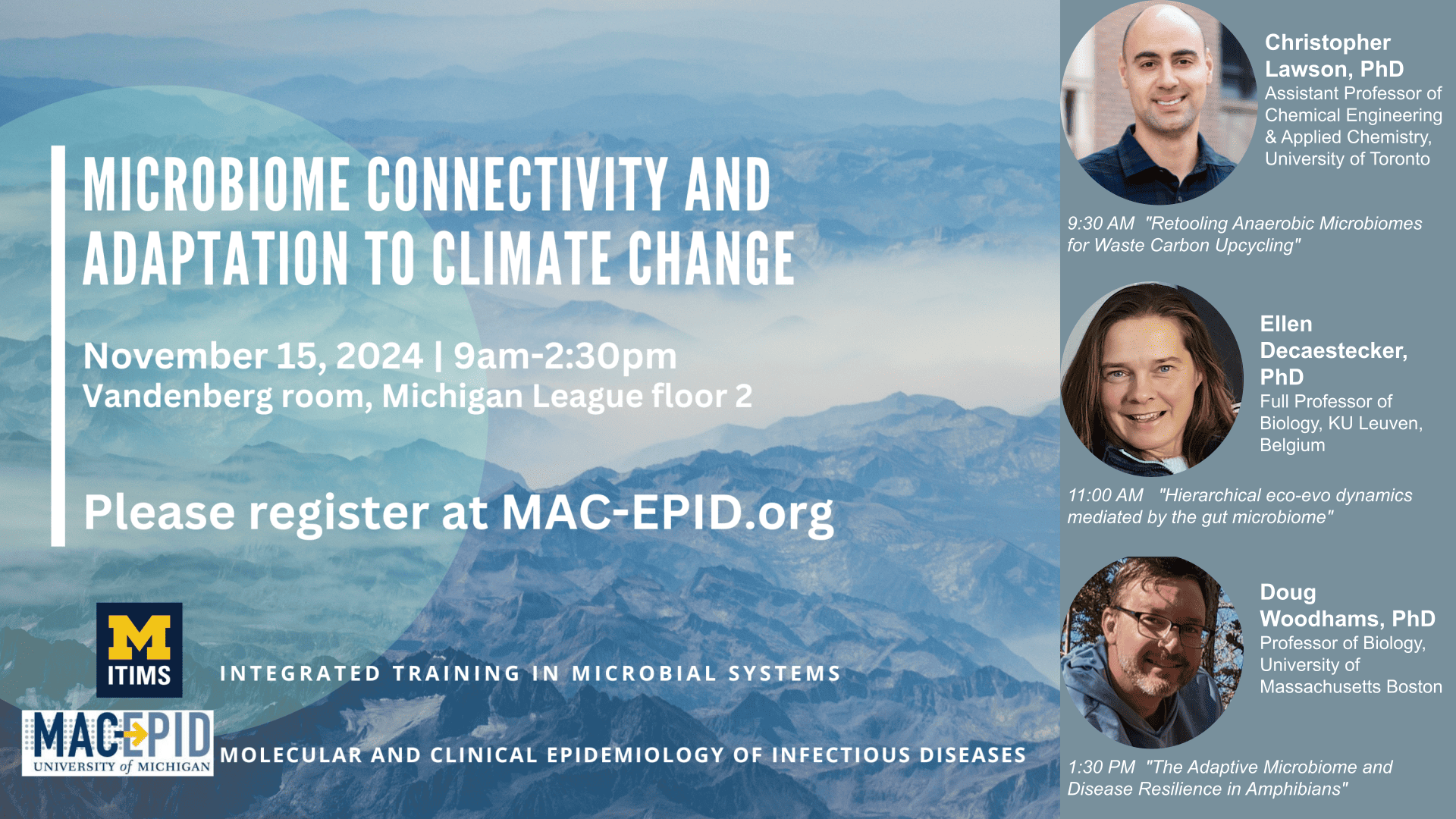9:30 AM "Retooling Anaerobic Microbiomes for Waste Carbon Upcycling"
Christopher Lawson, PhD (Assistant Professor of Chemical Engineering & Applied Chemistry, University of Toronto)
Introduced by student Renisha Karki.
Prof. Lawson and his team are interested in the biomanufacturing of sustainable chemicals from underutilized “waste” streams using engineered microbial communities (microbiomes). They integrate approaches from microbial ecology, automation, and metabolic engineering to develop synthetic microbial communities for waste-to-chemical conversion and to elucidate basic principles governing microbiome function.
11:00 AM "Hierarchical eco-evo dynamics mediated by the gut microbiome"
Ellen Decaestecker, PhD (Full Professor of Biology, KU Leuven, Belgium)
Introduced by student Alex Song.
Professor Decaestecker's research group, hosted at the KU Leuven Interdisciplinary Research Facility Life Sciences, investigates host-microbiome interactions in different model systems from invertebrates (water fleas, freshwater snails and spider mites) up to (marine) mammals and primates (lemurs and humans).
1:30 PM "The Adaptive Microbiome and Disease Resilience in Amphibians"
Doug Woodhams, PhD (Professor of Biology, University of Massachusetts Boston)
Introduced by student Riley Manuel.
Dr. Doug Woodhams is a disease ecologist working to understand the microbial contribution to immunity and the applications of altering microbiota for conservation and human health. Goals of the Woodhams lab are to effectively manage amphibian chytridiomycosis in a changing environment, to understand mechanisms of resilience to disease at the scales of individual, population, and landscape, and to develop an amphibian model system for mucosal immunity using vaccination and microbiome manipulation.
MAC-EPID & ITiMSMicrobiome connectivity and adapting to climate change
A joint symposium of MAC-EPID & ITiMS
 November 15, 2024
November 15, 2024
9:00 am - 2:30 pm
Hybrid: Vandenberg Room, 2nd floor Michigan League
This event is both online and in person
Sponsored by: MAC-EPID & ITiMS
Contact Information: Anna Cronenwett ([email protected])
This program or event is open to the alumni community
More Information & Registration
9:30 AM "Retooling Anaerobic Microbiomes for Waste Carbon Upcycling"
Christopher Lawson, PhD (Assistant Professor of Chemical Engineering & Applied Chemistry, University of Toronto)
Introduced by student Renisha Karki.
Prof. Lawson and his team are interested in the biomanufacturing of sustainable chemicals from underutilized “waste” streams using engineered microbial communities (microbiomes). They integrate approaches from microbial ecology, automation, and metabolic engineering to develop synthetic microbial communities for waste-to-chemical conversion and to elucidate basic principles governing microbiome function.
11:00 AM "Hierarchical eco-evo dynamics mediated by the gut microbiome"
Ellen Decaestecker, PhD (Full Professor of Biology, KU Leuven, Belgium)
Introduced by student Alex Song.
Professor Decaestecker's research group, hosted at the KU Leuven Interdisciplinary Research Facility Life Sciences, investigates host-microbiome interactions in different model systems from invertebrates (water fleas, freshwater snails and spider mites) up to (marine) mammals and primates (lemurs and humans).
1:30 PM "The Adaptive Microbiome and Disease Resilience in Amphibians"
Doug Woodhams, PhD (Professor of Biology, University of Massachusetts Boston)
Introduced by student Riley Manuel.
Dr. Doug Woodhams is a disease ecologist working to understand the microbial contribution to immunity and the applications of altering microbiota for conservation and human health. Goals of the Woodhams lab are to effectively manage amphibian chytridiomycosis in a changing environment, to understand mechanisms of resilience to disease at the scales of individual, population, and landscape, and to develop an amphibian model system for mucosal immunity using vaccination and microbiome manipulation.

